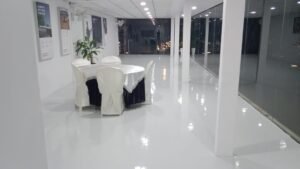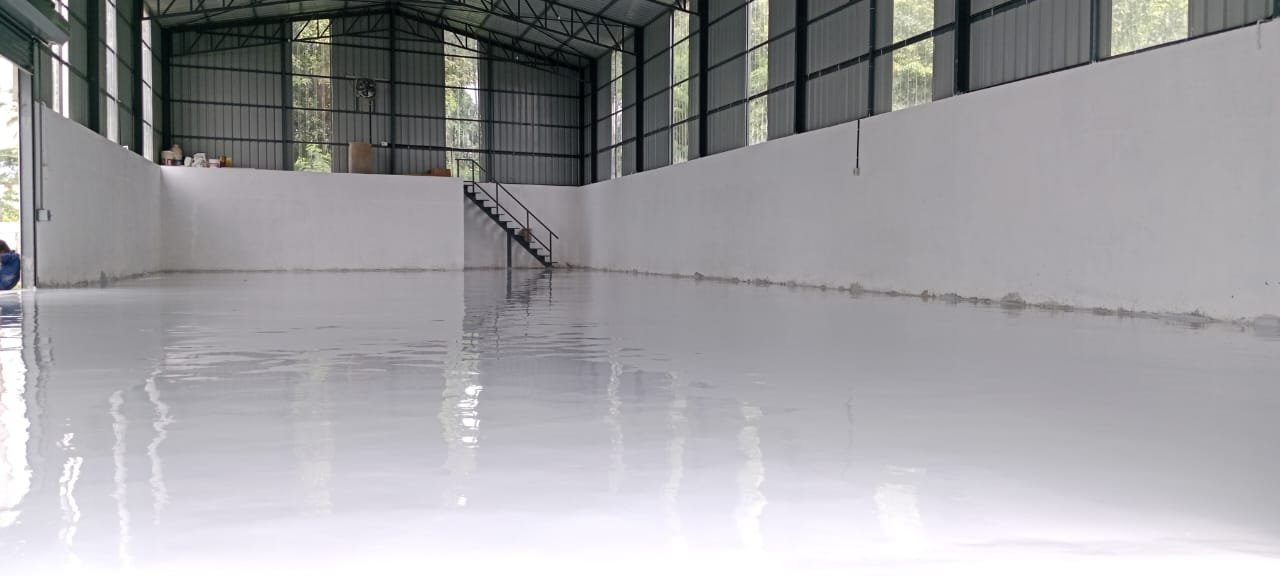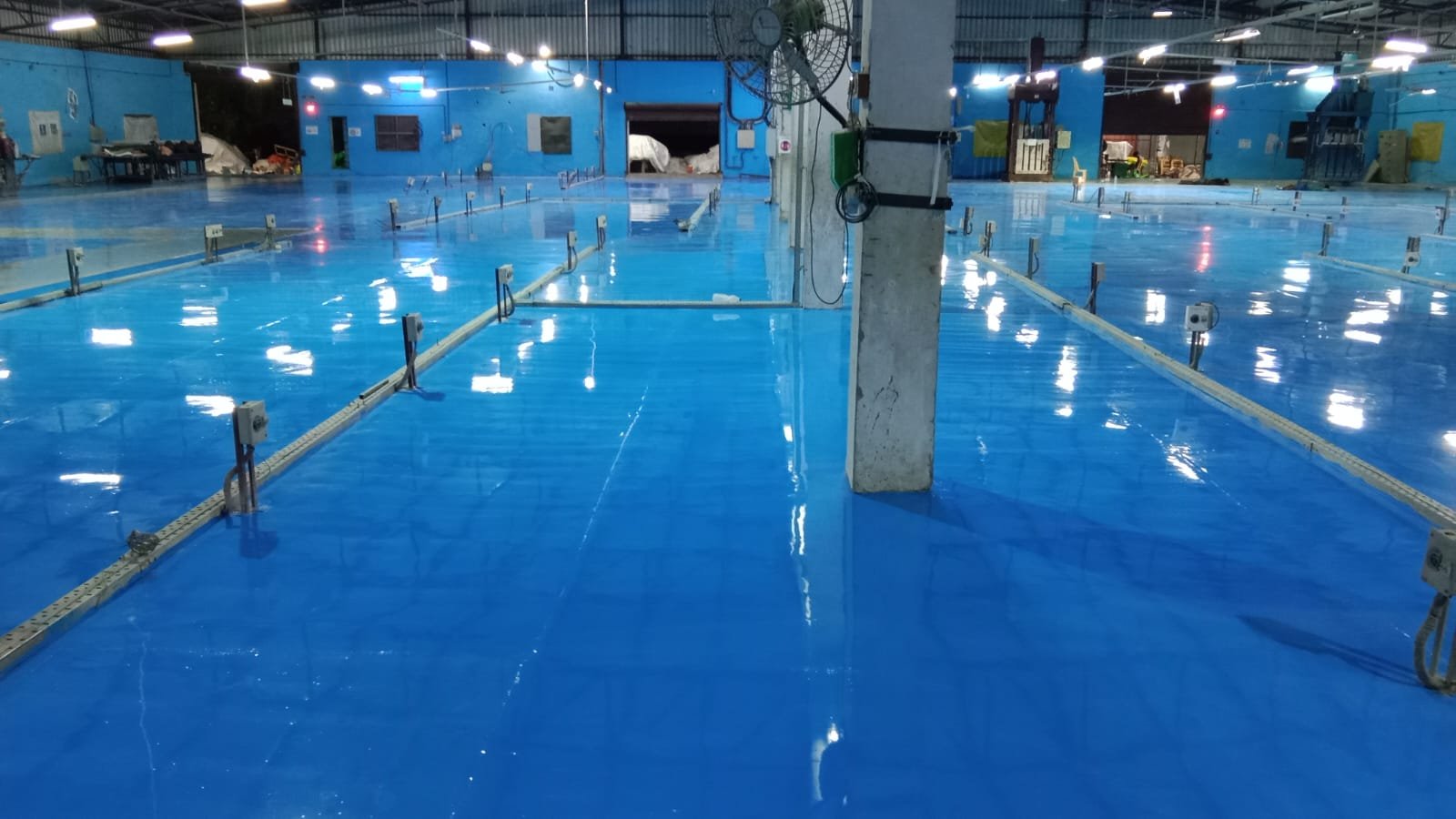ANTI-STATIC EPOXY FLOORING
ANTI-STATIC EPOXY FLOORING
TABLE OF CONTENTS
- INTRODUCTION
- PROCESS OF INSTALLING ANTI-STATIC EPOXY FLOORING
- ROLE OF AN ANTI-STATIC EPOXY FLOORING APPLICATOR
- ANTI-STATIC EPOXY FLOORING APPLICATIONS
- CONCLUSION
INTRODUCTION
Anti-static epoxy flooring is a specialized type of flooring system that is designed to help prevent static electricity buildup. It is often used in industrial or commercial settings where static electricity can cause problems, such as in clean rooms, server rooms, manufacturing plants, and laboratories.
The flooring is typically made from a combination of epoxy resins and conductive or dissipative materials, which help to prevent the buildup of static electricity. The material is applied to the concrete substrate using a trowel, roller or sprayer, and then cured to form a hard, durable surface.
There are several benefits to using anti-static epoxy flooring, including:
- Preventing electrostatic discharge (ESD) – Anti-static flooring helps prevent ESD, which can cause damage to sensitive electronic equipment and even start fires in certain environments.
- Easy to clean – Epoxy flooring is easy to clean and maintain, making it a popular choice for facilities that require a high level of cleanliness.
- Chemical and abrasion resistance – Epoxy flooring is resistant to chemicals and abrasion, which makes it suitable for use in environments where these factors are present.
- Durability – Epoxy flooring is known for its durability and long lifespan, which helps to reduce maintenance costs over time.
Anti-static epoxy flooring is an effective solution for preventing static electricity buildup in industrial and commercial settings, while providing a durable and easy-to-maintain surface.
PROCESS OF INSTALLING ANTI-STATIC EPOXY FLOORING
The process of installing anti-static epoxy flooring generally involves several steps, which can vary depending on the specific product and application method. Here is a general overview of the process:
- Surface Preparation: The first step is to prepare the substrate surface. This usually involves removing any existing flooring or coatings, grinding or shot blasting the surface to achieve a rough profile, and repairing any cracks or defects.

- Primer Application: Once the substrate is prepared, a primer is applied to the surface. The primer helps to promote adhesion and prevent moisture vapor transmission.
- Conductive or Dissipative Layer: Depending on the level of conductivity required, a conductive or dissipative layer is applied on top of the primer layer. This layer is usually made of a combination of epoxy resin and conductive or dissipative fillers.
- Broadcast Layer: Once the conductive or dissipative layer is applied, a broadcast layer of conductive or dissipative material is spread evenly over the surface. This layer helps to ensure a consistent level of conductivity throughout the flooring system.
- Seal Coat: After the broadcast layer is applied and has cured, a seal coat is applied on top to seal and protect the surface. This layer is usually made of clear epoxy resin and helps to provide a glossy finish while also adding an extra layer of protection.
- Curing: The final step is to allow the flooring system to cure for the recommended time. This can take anywhere from a few hours to several days, depending on the specific product and environmental conditions.
The process of installing anti-static epoxy flooring requires careful preparation, application, and curing to ensure a high-quality, durable, and effective surface that can prevent static electricity build up. It’s recommended to consult with a professional flooring contractor to ensure the best results.
ROLE OF AN ANTI-STATIC EPOXY FLOORING APPLICATOR
The role of an anti-static epoxy flooring applicator is to ensure that the flooring system is installed correctly and meets the required specifications. Here are some of the key responsibilities of an anti-static epoxy flooring applicator:
- Surface Preparation: The applicator is responsible for preparing the substrate surface properly, which includes removing any existing coatings, grinding or shot blasting the surface, and repairing any cracks or defects.
- Product Selection: The applicator is responsible for selecting the appropriate anti-static epoxy flooring product based on the project’s specific requirements, such as the level of conductivity needed, the type of traffic expected, and the environmental conditions.
- Application: The applicator is responsible for applying the flooring system in accordance with the manufacturer’s instructions, including mixing the products, applying them evenly, and achieving the desired thickness.
- Quality Control: The applicator is responsible for monitoring the installation process and ensuring that the final product meets the required specifications and quality standards.
- Safety: The applicator is responsible for ensuring that the installation process is carried out safely, with the appropriate protective gear and safety procedures in place.
- Maintenance: After the installation is complete, the applicator may provide guidance on how to maintain and clean the anti-static epoxy flooring system to ensure its longevity and effectiveness.
The anti-static epoxy flooring applicator plays a critical role in ensuring that the flooring system is installed correctly, meets the required specifications, and provides an effective solution for preventing static electricity buildup in industrial and commercial settings.
ANTI-STATIC EPOXY FLOORING APPLICATIONS
Anti-static epoxy flooring is used in various industrial and commercial settings where static electricity buildup can cause problems. Here are some common applications for anti-static epoxy flooring:
- Clean rooms and laboratories: Anti-static epoxy flooring is used in clean rooms and laboratories to prevent electrostatic discharge (ESD) that can damage sensitive equipment, interfere with experiments, or contaminate the environment.

- Server rooms and data centers: Anti-static epoxy flooring is used in server rooms and data centers to prevent ESD that can damage critical IT equipment or disrupt network operations.
- Manufacturing plants: Anti-static epoxy flooring is used in manufacturing plants to prevent ESD that can damage electronic components or ignite flammable materials.
- Warehouses and distribution centers: Anti-static epoxy flooring is used in warehouses and distribution centers to prevent ESD that can damage electronic components or ignite flammable materials stored in the facility.
- Hospitals and healthcare facilities: Anti-static epoxy flooring is used in hospitals and healthcare facilities to prevent ESD that can damage sensitive medical equipment or interfere with medical procedures.
- Retail stores and showrooms: Anti-static epoxy flooring is used in retail stores and showrooms that feature electronic displays, such as electronics stores or automobile showrooms.
Overall, anti-static epoxy flooring is used in any setting where static electricity buildup can cause problems, including damage to equipment, safety hazards, and contamination risks.
CONCLUSION
Anti-static epoxy flooring is a specialized type of flooring system designed to prevent electrostatic discharge (ESD) in industrial and commercial settings. It consists of a combination of epoxy resin and conductive or dissipative fillers that create a conductive or dissipative layer to prevent static electricity buildup. The flooring system is installed through a multi-step process that involves surface preparation, primer application, conductive or dissipative layer application, broadcast layer application, and seal coat application. Anti-static epoxy flooring is commonly used in clean rooms, laboratories, server rooms, manufacturing plants, warehouses, hospitals, and retail stores where ESD can cause equipment damage, safety hazards, or contamination risks. The proper installation of anti-static epoxy flooring requires the expertise of a professional flooring contractor to ensure that the flooring system meets the required specifications and quality standards. With its effectiveness in preventing ESD, anti-static epoxy flooring has become an essential solution for various industries and facilities that rely on the proper function and operation of electronic equipment.
We at Texel Agency will help you to achieve best in class Anti-Static Epoxy Flooring. We do help you to lay VDF Flooring and all Epoxy flooring, PU flooring, concrete laying, concrete polishing & waterproofing.
Texel agency is one of the best anti-static epoxy flooring contractors in Coimbatore. Our anti-static epoxy flooring price is very optimum with best quality.
Our PU flooring service is being extended to all over south india.
Texel Agency is also one of the best epoxy flooring applicators in Coimbatore. Our Epoxy flooring service is being extended to all over south india.
Our Epoxy Flooring service is being given in important cities like Coimbatore, Chennai, Bangalore, Hosur, Madurai, Thiruvananthapuram, Kochi & Calicut. Our Epoxy flooring service is being given at very optimum price.
Please call us for the best Industrial flooring solution,
Leave a Reply
You must be logged in to post a comment.






